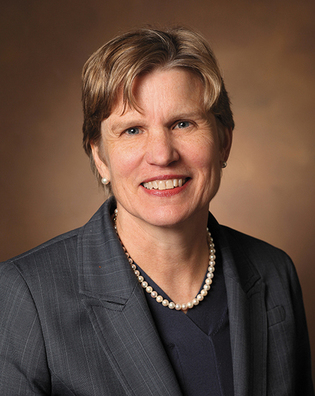 loading
loading
Light & VerityCollege alum is Yale Med’s first woman deanNancy Brown ’81 led a nationally recognized program in pharmacology at Vanderbilt.  Anne RaynerNancy J. Brown ’81 returns to Yale after a 30-year career at Vanderbilt’s School of Medicine. View full imageIt was an introductory biology class at Yale that set Nancy J. Brown ’81 on the road to becoming a physician. Inspired by hearing a pair of Nobel laureates explain their research, Brown wound up majoring in molecular biophysics and biochemistry. Then a mentor persuaded her to take the MCAT, and she graduated with honors from Harvard Medical School. In February, Brown will return to her alma mater to become the Yale School of Medicine’s 19th dean—the first woman to hold that post. Brown succeeds Robert Alpern, who is stepping down after three five-year terms as dean. Alpern will remain on the YSM faculty. Brown has made her career at Vanderbilt University, where she began a research fellowship in clinical pharmacology in 1989. She was chief resident in medicine from 1991 to 1992, when she joined the School of Medicine faculty. In 2009, she was named chief of clinical pharmacology. She has been the chair of the Department of Medicine since 2010. During Brown’s tenure, the Department of Medicine expanded significantly, and she increased the number of residents, fellows, faculty, and leaders from groups traditionally underrepresented in medicine. Brown has also led a nationally recognized research program in cardiovascular pharmacology. While chairing the department, Brown continued to see patients. “Taking care of patients is an honor,” she says. “And it is essential for me to understand personally what is and is not working in the hospital.” In an academic medical center, “clinical observations inform research questions, and scientific thinking leads to better clinical care,” Brown says. “Near the end of my residency, my mother-in-law was diagnosed with glioblastoma. She died 15 months later of a disease for which we still have no therapies. That experience of being a patient’s family member has reinforced for me the importance of attention to detail in the care of patients and the need for discovery research.” In 2000, she cofounded the Vanderbilt Master of Science in Clinical Investigation program to promote the advancement of patient-oriented researchers. Brown says that balancing the missions of education, research, and patient care is an important challenge for academic medical centers. She underscores the importance of career development, explaining that a robust career development infrastructure can increase diversity in the higher echelons of academic medicine. “The future of medicine and scientific discovery also requires that we develop excellent collaborating skills,” she says. “Schools like Yale train leaders who can make the world better. I’m looking forward to working with talented people who will solve problems together,” Brown says. “My first job here will be to listen—so everyone will be seeing a lot of me.”
The comment period has expired.
|
|